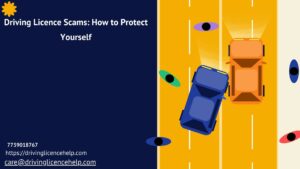
In today’s digital age, driving licence scams have become increasingly prevalent. These scams can lead to significant financial loss, identity theft, and legal issues for unsuspecting individuals. As a responsible driver or someone looking to obtain a driving licence, it is crucial to be aware of these scams and know how to protect yourself. This comprehensive guide will help you understand the different types of driving licence scams, their potential impact, and the measures you can take to safeguard yourself.
Understanding Driving Licence Scams
Driving licence scams can take various forms, from fraudulent websites offering fake licences to phishing emails seeking personal information. Here are some common types of driving licence scams:
1.Fake Licence Websites: Scammers create websites that look like official government portals, offering to expedite the driving licence application process for a fee. These sites often promise quick and easy licences without the need for a driving test.
2.Phishing Emails and Messages: Scammers send emails or text messages that appear to be from official government agencies. These messages typically contain links to fake websites designed to steal personal information, such as your name, address, and Social Security number.
3.Social Media Scams: Fraudsters use social media platforms to advertise fake driving licences. They may claim to offer genuine licences without the need for tests or paperwork, often for a high price.
4.Third-Party Service Scams: Some scammers pose as third-party agencies that claim to handle all your driving licence needs for a fee. These services are often bogus and can result in identity theft or financial loss.
The Impact of Driving Licence Scams
Falling victim to a driving licence scam can have severe consequences:
1.Financial Loss: You may lose money by paying fees for fake licences or services that do not exist. Recovering these funds can be challenging, especially if the scammer is based overseas.
2.Identity Theft: Scammers often seek personal information, which can be used to steal your identity. This can lead to fraudulent activities in your name, affecting your credit score and financial stability.
3.Legal Issues: Using a fake driving licence is illegal and can result in fines, legal action, and a criminal record. Even if you were unaware that the licence was fake, you could still face penalties.
4.Driving Ban: If caught with a fake licence, you may face a driving ban, which can disrupt your daily life and career, especially if you rely on driving for your job.
How to Protect Yourself from Driving Licence Scams
To avoid falling victim to driving licence scams, follow these essential tips:
1.Use Official Government Websites: Always use official government websites for driving licence applications and renewals. Look for URLs ending in .gov or other official domain extensions specific to your country.
2.Verify the Website’s Authenticity: Check the website’s SSL certificate (indicated by a padlock icon in the address bar) to ensure it is secure. Official government websites will also have contact information and customer service numbers that you can verify independently.
3.Be Wary of Unsolicited Emails and Messages: Do not click on links or download attachments from unsolicited emails or text messages claiming to be from government agencies. Instead, visit the official website directly by typing the URL into your browser.
4.Avoid Third-Party Services: Be cautious of third-party services that offer to handle your driving licence application or renewal for a fee. Most official processes do not require third-party involvement and can be completed directly through government portals.
5.Research and Reviews: Before using any service or website, conduct thorough research. Look for reviews and feedback from other users. If the service has a lot of negative reviews or no reviews at all, it’s best to avoid it.
6.Secure Your Personal Information: Do not share your personal information, such as your Social Security number, driver’s licence number, or bank details, with unverified sources. Always ensure you are on a secure and authentic website before entering sensitive information.
7.Report Suspicious Activities: If you come across a suspicious website or receive a fraudulent message, report it to the relevant authorities. In the United States, you can report to the Federal Trade Commission (FTC) or the Department of Motor Vehicles (DMV).
8.Educate Yourself and Others: Stay informed about the latest scams and share this information with friends and family. The more people are aware of these scams, the harder it becomes for fraudsters to succeed.
What to Do If You Fall Victim to a Driving Licence Scam
If you suspect that you have fallen victim to a driving licence scam, take immediate action to minimize the damage:
1.Report to Authorities: Contact your local law enforcement and report the scam. Provide them with all the details, including any correspondence with the scammer.
2.Notify Your Bank: If you have provided financial information, contact your bank or credit card company to report the fraud. They can help you monitor your accounts for suspicious activity and take steps to protect your funds.
3.Monitor Your Credit: Regularly check your credit reports for any unauthorized activities. You can request a free credit report annually from major credit bureaus.
4.Change Passwords: If you have used the same password for multiple accounts, change them immediately. Use strong, unique passwords for each account to enhance security.
5.Seek Legal Advice: If you face legal issues due to a fake driving licence, consult with a legal professional who can guide you through the process and help mitigate any penalties.
Suggested read : DRIVING LICENCE GUIDANCE
Conclusion
Driving licence scams are a growing concern in our digital world. By understanding the various types of scams and taking proactive steps to protect yourself, you can avoid falling victim to these fraudulent schemes. Always use official government websites, be cautious of unsolicited communications, and safeguard your personal information. If you do encounter a scam, report it immediately and take steps to secure your identity and finances. Staying informed and vigilant is your best defense against driving licence scams, ensuring you can obtain and renew your licence safely and legally.


